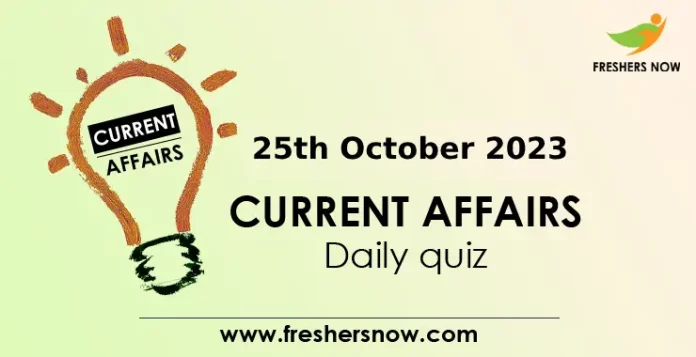
25th October 2023 Current Affairs Quiz: Welcome to the Current Affairs Quiz for 25th October 2023. Stay updated with the latest news and events from around the world by testing your knowledge with our quiz. These questions will cover a wide range of topics, from politics and international affairs to technology and culture. Let’s dive into the quiz and see how well you’re informed about the current affairs of the day!
25th October 2023 Current Affairs | Today GK Quiz
1. What was the major concern for the Euro Zone as reported in the article?
A) Decline in services sector
B) ECB President’s outlook on interest rates
C) Geopolitical tensions in the Middle East
D) Reduced business activity and economic struggles
Answer: D) Reduced business activity and economic struggles
Explanation: The significant setback in Euro Zone businesses, with a widespread drop in demand, raising concerns about a possible recession, which is the major concern.
2. Which Euro Zone country faced a fourth consecutive month of reduced business activity, affecting both manufacturing and services sectors?
A) France
B) Germany
C) The UK
D) Italy
Answer: B) Germany
Explanation: Germany, the largest Euro Zone economy, faced a fourth consecutive month of reduced business activity, affecting both manufacturing and services sectors.
3. What is the primary reason for ONGC’s acquisition of PTC India Ltd’s wind power unit?
A) To increase its production of oil and gas
B) To diversify its business interests beyond hydrocarbon operations
C) To secure a bid for renewable energy projects in Rajasthan
D) To reduce its reliance on fossil fuels
Answer: B) To diversify its business interests beyond hydrocarbon operations
Explanation: ONGC’s acquisition of PTC India Ltd’s wind power unit is a strategic move to expand its renewable energy portfolio and reduce its reliance on fossil fuels.
4. What is ONGC’s ambitious goal related to carbon emissions, and what is its financial commitment to achieve this goal?
A) To achieve zero carbon emissions by 2030, with a commitment of Rs 1 lakh crore
B) To achieve zero carbon emissions by 2038, with a commitment of Rs 2 lakh crore
C) To reduce carbon emissions by 50% by 2030, with a commitment of Rs 1 lakh crore
D) To achieve zero carbon emissions by 2030, with a commitment of Rs 2 lakh crore
Answer: B) To achieve zero carbon emissions by 2038, with a commitment of Rs 2 lakh crore
Explanation: ONGC has declared its ambitious goal to achieve zero carbon emissions by 2038 and has pledged to invest Rs 2 lakh crore to realize this objective.
5. By 2030, what is India’s predicted GDP in United States dollars (USD) according to the article?
A) $1.8 trillion
B) $3.5 trillion
C) $7.3 trillion
D) $13.1 trillion
Answer: C) $7.3 trillion
Explanation: India’s GDP is predicted to jump from $3.5 trillion in 2022 to $7.3 trillion by 2030.
6. What is one of the key growth drivers of India’s long-term economic prospects mentioned in the article?
A) Declining urban household incomes
B) Rapid reduction in foreign investments
C) Expanding and thriving middle class
D) Slow adoption of internet technology
Answer: C) Expanding and thriving middle class
Explanation: One of the key growth drivers for India’s long-term economic prospects is its expanding and thriving middle class, which plays a crucial role in boosting consumer spending.
7. What is the payload capacity of Skyroot’s Vikram-1 orbital rocket to Low Earth Orbit (LEO)?
A) Approximately 300 tons
B) Approximately 300 kg
C) Approximately 300 pounds
D) Approximately 300 miles
Answer: B) Approximately 300 kg
Explanation: Vikram-1 has a payload capacity of approximately 300 Kg to Low Earth Orbit.
8. When is the first full-fledged developmental test launch of Vikram-1 expected to take place, according to Pawan Kumar Chandana?
A) In the early months of 2024
B) In November 2022
C) In the later part of 2024
D) In 2040
Answer: A) In the early months of 2024
Explanation: The first full-fledged developmental test launch of Vikram-1 is expected in the early months of 2024.
9. What is the responsibility of the Election Commission of India (ECI) regarding symbol allocation in Indian politics?
A) Creating new symbols for every election
B) Deciding on symbol allocation for recognized political parties
C) Providing symbols exclusively to unregistered parties
D) Conducting brainstorming sessions for symbol selection
Answer: B) Deciding on symbol allocation for recognized political parties
Explanation: The Election Commission of India (ECI) is responsible for allocating symbols to political parties, including recognized parties.
10. How do unregistered parties propose new symbols for consideration by the EC?
A) By choosing from a list of symbols provided by the EC
B) By selecting symbols with religious or communal connotations
C) By proposing three new symbols that resemble existing symbols
D) By ensuring their proposed symbols do not depict animals or birds and have no religious or communal connotations
Answer: D) By ensuring their proposed symbols do not depict animals or birds and have no religious or communal connotations
Explanation: Unregistered parties can propose three new symbols for consideration by the EC, provided those symbols do not depict animals or birds and have no religious or communal connotations.
★★ You Can Also Check ★★



